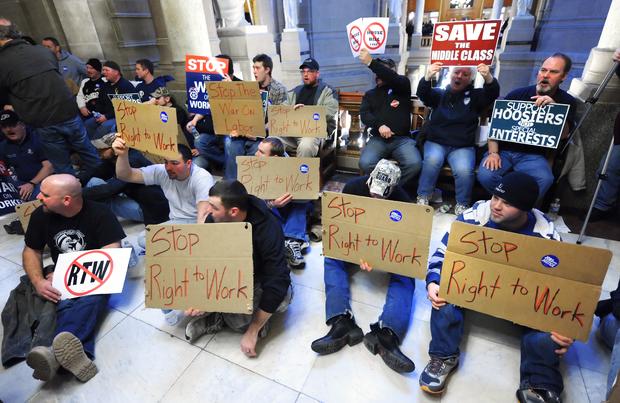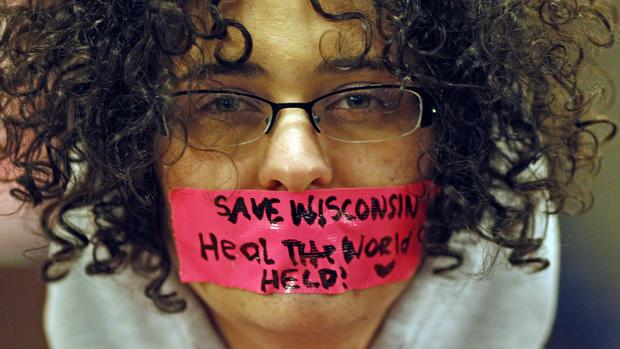Indiana Dems follow Wisconsin Dems to Illinois, fleeing anti-union vote
Updated at 4:45 p.m. ET with Daniels' statement urging Republicans to set aside the legislation.
Taking a page from the Democratic playbook in Wisconsin, Indiana Democrats fled to Illinois today to thwart Republican efforts to pass anti-union legislation.
Only two of 40 Democrats were present for today's Illinois House session, the the Indianapolis Star reports, depriving the legislative body of the 67 lawmakers needed to call a quorum and conduct official business. The two Democrats present were there in the event they needed to make a motion and second a motion, to ensure Republicans did not conduct any business without a quorum, according to the Star.
An unnamed source told the newspaper that the Democrats likely fled to Illinois, where Democratic Gov. Pat Quinn would likely help the lawmakers avoid being taken into police custody and returned to Indiana. When asked whether he would call Indiana State Police to round up the lawmakers, Republican Indiana House Speaker Brian Bosma said, "We'll see how the day goes."
Wisconsin Democrats similarly fled to Illinois last week to avoid an anti-union vote and have yet to return.
Indiana Democratic chair Dan Parker told the Washington Post that he was not sure if all of the Democratic House members had left the state yet, but that "they are not going to allow Republicans to try to lower wages for middle-class Hoosiers."
"Republicans have decided to bring their Wisconsin assault to Indiana, and we're not going to just sit around and take it," he said.
At issue is a Republican bill that would prohibit union membership or fees from being a condition of employment. Supporters call it the "right to work" bill and argue that obligatory union dues -- even for those who do not join a union -- are an impediment to business in the state. Opponents, who call it the "right to work for less" measure, argue it would weaken unions and thus drive down wages.
Republican Indiana Gov. Mitch Daniels has said he supports the policy but has said other legislative matters should come before this, according to the Star. Daniels gave a statement to WISH-TV today, saying, "For reasons I've explained more than once I thought there was a better time and place to have this very important and legitimate issue raised."
Furthermore, the governor said he won't be sending the state police after the Democrats. "I'm not gonna divert a single trooper from their job of protection the Indiana public," he said. "I trust that people's consciences will bring them back to work."
Still, on NPR on Monday, Daniels praised Republican Wisconsin Gov. Scott Walker for pushing legislation in his state that would scale back collective bargaining rights for public unions.
"I think that what [Wisconsin Gov. Scott Walker] is trying to do is in the public interest," Daniels said. "The most powerful special interests in America today are the government unions."
Thousands of workers protested at the Indiana Statehouse Monday morning, according to the Associated Press, and the AFL-CIO is leading continuing rallies today. Rallies continue today in Wisconsin as well.
Meanwhile, union protests are also continuing in Ohio, where police and firefighters stand in opposition to a Republican plan to weaken collective bargaining rights, the Cleveland Plain Dearler reports.
As the debate over public spending and unions continues to spread across the country, more lawmakers are weighing in. On CBSNews.com's "Washington Unplugged" yesterday, Republican Virginia Gov. Bob McDonnell reiterated his support for Walker, saying, "every governor's got tough choices to make."
Watch the interview below:

